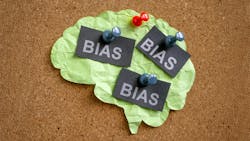Key Takeaways
- Bias is everywhere: From role stereotyping to cultural prejudices, multidisciplinary teams in the chemical industry face unique challenges.
- The impact is significant: Bias stifles innovation, reduces morale, and increases turnover, making it a critical issue for organizational success.
- Action is necessary: Strategies like bias training, inclusive leadership and structured decision-making can create fairer, more supportive workplaces.
- Accountability drives change: Measurable goals, regular audits and transparent communication ensure that efforts to combat bias are effective and sustained.
- Individual contributions matter: Employees can challenge assumptions, advocate for fairness and build inclusive relationships.
The chemical industry thrives on innovation, collaboration and precision. Yet, like many other sectors, it faces the persistent challenge of workplace bias – subtle or overt prejudices that undermine team cohesion, hinder career progression and stifle innovation. Multidisciplinary teams are particularly vulnerable to bias due to their diverse roles and cultural backgrounds.
To foster a fair and supportive work environment, it is critical to identify workplace stereotypes, understand their root causes and adopt proactive strategies to address them. You don’t have to have a formal DEI program to benefit from better navigating bias.
Recognizing Common Biases in Multidisciplinary Teams
Bias often stems from stereotypes – preconceived notions about individuals based on their gender, ethnicity, role or background. Within multidisciplinary teams, these biases can manifest in several ways:
- Role Stereotyping: Assumptions about specific disciplines – e.g., engineers are analytical but lack interpersonal skills or operators are task-oriented but not strategic – can devalue the unique contributions of team members, leading to unequal opportunities for recognition and growth.
- Gender Bias: Perceptions that women in leadership roles are less competent or lack authority can limit their career progression, opportunities and influence. It can also perpetuate a lack of diversity in leadership roles.
- Cultural Bias: The view that individuals from certain cultural backgrounds are less innovative or are less technically proficient may result in exclusion, miscommunication and reduced collaboration within teams.
- Confirmation Bias: Prejudgments about a person’s abilities based on previous experiences or stereotypes reinforce inequities, making it difficult for individuals to start fresh and break free from preconceived notions.
The Cost of Bias
Workplace bias doesn’t just affect individuals – it undermines the performance of entire teams through:
- Reduced Innovation: Diverse teams are proven to drive innovation, but bias can stifle contributions from under-recognized voices, leading to missed opportunities.
- Lower Morale and Engagement: Employees who feel undervalued or stereotyped are less likely to be engaged, affecting overall productivity.
- Attrition: Bias contributes to higher turnover rates, particularly among women and minorities who may feel alienated in their roles.
The stakes are even higher for the chemical industry, where precision and collaboration are critical.
Strategies for Overcoming Bias
- Fostering Awareness Through Training: Use real-world examples relevant to the chemical industry to help employees recognize and address bias.
- Encouraging Open Dialogue: Create safe spaces for discussing experiences and feedback, both anonymously and directly.
- Evaluating Recruitment and Promotion Practices: Use structured interviews, standardized criteria and blind resumé screening to reduce subjectivity.
- Promoting Inclusive Leadership: Train leaders to recognize bias and sponsor under-recognized employees for career development.
- Celebrating Diverse Contributions: Highlight and reward achievements from all team members, ensuring equal recognition.
- Implementing Structured Decision-Making: Leverage data and collaborative processes to reduce bias in promotions and evaluations.
Building a Culture of Accountability
Overcoming bias is not a one-time effort – it requires a sustained commitment to cultural change. Organizations can:
- Set Measurable Goals: Track metrics such as diversity in leadership, engagement scores and turnover rates.
- Conduct Regular Audits: Review workplace policies for potential biases and make necessary adjustments.
- Promote Transparency: Share progress on diversity and inclusion initiatives to build trust and accountability.
A Vision for a Bias-Free Chemical Industry
The chemical industry has a unique opportunity to lead by example in creating fair and inclusive workplaces. By addressing bias, organizations can unlock the full potential of their teams, drive innovation and build a culture where everyone feels valued.
Navigating bias is not easy, but the rewards—improved collaboration, increased engagement and a stronger industry reputation—are well worth the effort. Together, we can move toward a future where stereotypes no longer hold anyone back and every voice has the opportunity to shine and be celebrated.
About the Author
Lauren Neal
Founder and Chief Program Creator, Valued at Work
Lauren Neal is the Founder of Valued at Work – a consultancy that creates workplace cultures where no one wants to leave, in traditionally male-dominated sectors.
Since 2005, Lauren has worked as an engineer and project manager in the energy sector offshore, onshore and onsite on multimillion-dollar projects across the globe. Chartered through both the Institution of Engineering and Technology (IET) and the Association of Project Management (APM), Lauren is a sought-after speaker, writer, and consultant championing career progression within STEM and inclusive workplace cultures beyond the boundaries of demographics.
Lauren’s book released in October 2023 – 'Valued at Work: Shining a Light on Bias to Engage, Enable, and Retain Women in STEM' – became an Amazon #1 best-seller and is a finalist in the 2024 Business Book Awards.
Click here to reach out to Lauren.

